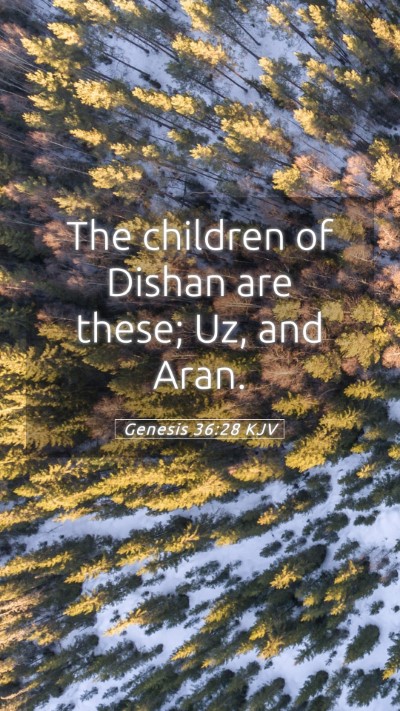Understanding Genesis 36:28 - A Comprehensive Bible Verse Commentary
Genesis 36:28 states: "The children of Dishan were these; Uz and Aran." In the context of biblical narrative, this verse provides essential genealogical information, revealing the descendants of Esau and the formation of the Edomite nation.
Bible Verse Meanings
This verse may initially appear to be a simple list of names, yet it serves a significant role within the greater biblical narrative, offering insights into familial lines and tribal identities critical to understanding Israel’s history.
Bible Verse Interpretations
-
Matthew Henry's Commentary: Henry emphasizes the importance of genealogy in the Scriptures, noting that they not only preserve history but also establish the fulfillment of God’s promises through various lines of descent. He points out the significance of listing the sons of Dishan, as this sets the stage for the reader to understand the political and social structures of surrounding nations.
-
Albert Barnes' Notes: Barnes states that the names of the descendants listed here can provide insights into the culture and language of the time. The etymology and meanings of the names, such as "Uz" which can reference "desire" or "strength", and "Aran", may also carry implications for understanding the character associated with these tribes.
-
Adam Clarke's Commentary: Clarke expands upon the individual significance of the names, discussing their historical relevance as progenitors of various groups, possibly linked to trade, farming, and various arts. This grounding allows readers to appreciate the socio-economical landscape in which these descendants thrived.
Bible Verse Understanding
The understanding of this verse requires an appreciation for the historical context of the Edomites and their relationship with the Israelites. It is essential for Bible study groups and individuals engaging in online Bible study to grasp how this genealogy fits into the overarching narrative of the struggle between these two nations.
Bible Verse Explanations
The listing of names serves more than an archival purpose; it demonstrates God’s fidelity in establishing a people who will experience His presence, even as they pursue their own paths apart from Israel. This reflects the complexity of divine purpose and human choice, a recurring theme in biblical scriptures.
Key Themes in Genesis 36:28
- Genealogy and Identity: How genealogies provide a sense of belonging and identity.
- Historical Context: Understanding the Edomite line provides insights into Israel's geopolitical relationships.
- Fulfillment of Promise: This genealogy signifies the fulfillment of God’s promises to Abraham concerning his multitude of descendants.
Cross References
- Genesis 25:30 - The birth of Esau and Jacob.
- Genesis 36:1 - The lineage of Esau, known as Edom.
- 1 Chronicles 1:35-36 - A parallel listing of Esau's descendants.
- Obadiah 1:10-14 - The conflict between the Edomites and Israelites.
Applying Genesis 36:28 to Daily Life
Understanding Genesis 36:28 can guide us in recognizing the importance of our own heritage and relationships. Just as these names anchor the Edomites in history, so does our own family and spirituality shape who we are today. In studying one’s genealogy, we trace the paths that have brought us to our present and reflect on the divine influences that guide us.
Conclusion
Genesis 36:28, while brief, opens a window into the past that enhances our comprehension of biblical history. The careful study of such verses, offering Bible verse meanings, interpretations, and explanations, is essential for accurate biblical exegesis. Through resources such as Bible study guides, tools, and online courses, we can deepen our understanding of Scripture, paving the way for enriched faith and community discourse.


